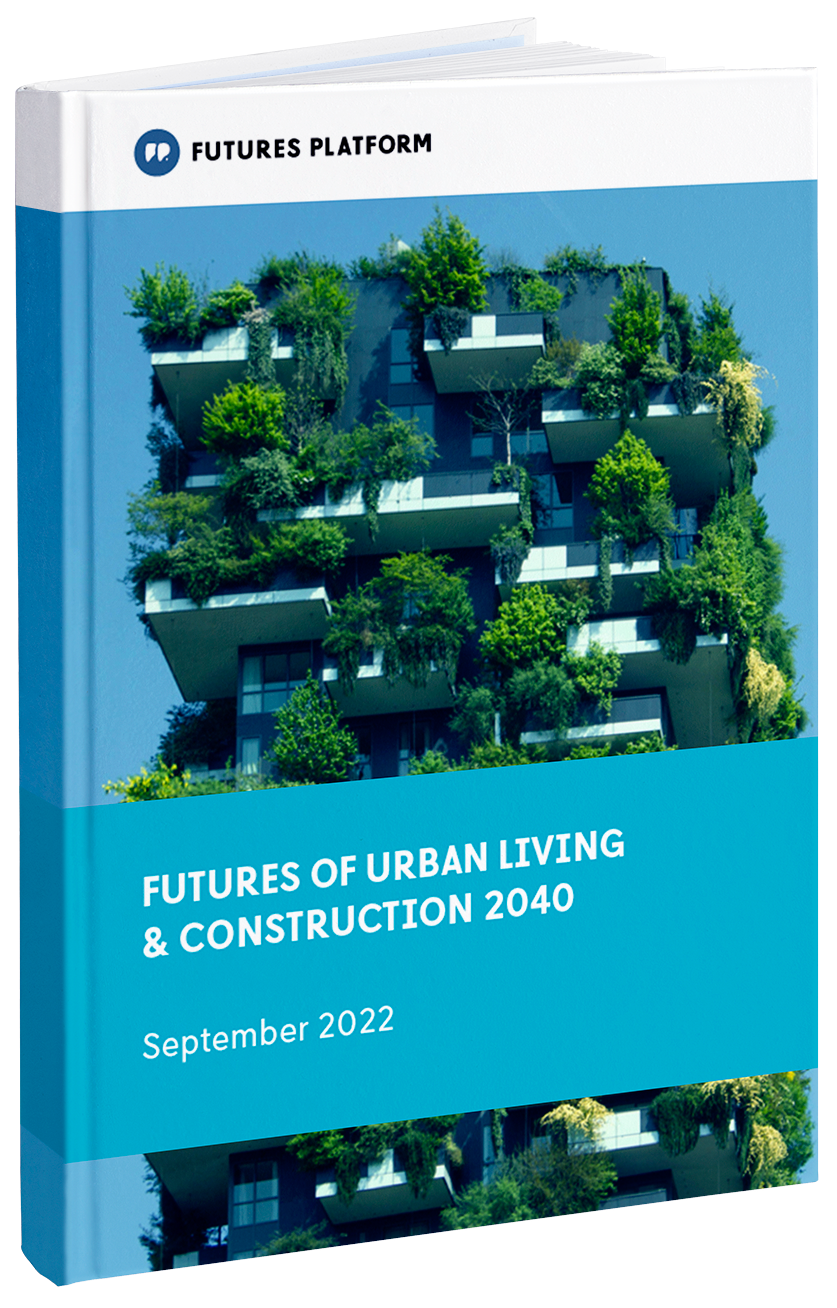Homes of the Future: A Sea of Possibilities
New players in the housing industry are stepping up with all-inclusive packaged housing in holiday destinations ranging from old-world glamour to modern metropolis and ocean cruises – not of a lifetime, but rather, for a lifetime.
FUTURE PROOF – BLOG BY FUTURES PLATFORM
The world emerging from the pandemic is different. People view their lives through a lens focused on personal happiness and fulfilment, and populations have been shifting as many workers are now free to live where they want to, no longer tethered to a specific desk in a specific building. Remote education, shopping and healthcare continue to be popular, having proved to be not only viable and scalable, but in some cases preferable to pre-pandemic offerings. With so many people able to live, work or retire anywhere, where – and what – are the homes of the future?
As populations continue to shift, urban areas run out of land, and mixed-use is the answer of the moment. Many municipalities are encouraging and fast-tracking approvals for homeowners to build accessory dwelling units (ADUs) and install prefab offices in their gardens. High-rise, high-density housing is being built with restaurants, grocers and other popular retailers as the ground-level tenants.
The millennial generation, for whom homeownership is happening later in life – or not at all, make up the majority of renters in these buildings, many in co-living arrangements just to afford these convenient yet difficult-to-afford city lifestyles. This generation grew up in the information age and is now working in technology-based industries located in some of the most expensive cities in the world.
After being trapped in small, shared spaces 24/7 during the pandemic, millennials are eager to start checking items off their bucket lists while continuing to build their careers, relationships and families. And new players in the housing industry are stepping up with all-inclusive packaged housing in holiday destinations ranging from old-world glamour to modern metropolis and ocean cruises – not of a lifetime, but rather, for a lifetime.
Subscribe to our weekly newsletter
THE BRANDED FUTURE OF REAL ESTATE
In the spring of 2020, the future of travel looked bleak at best. Major hotel chains began shifting their marketing focus towards long-term and even permanent stays, from being like a home away from home to being home itself. They began or accelerated the building and conversion of hotel and resort properties into residential communities.
This has accelerated the private sector’s foray into city building and the accompanying branded living trend, which was already gaining momentum prior to the pandemic. Corporations such as Volkswagen and Aston Martin also joined established hoteliers like the Four Seasons and Marriott in creating staffed apartments (with concierge services and restaurants) in a variety of exclusive, trendy locations across the globe. The luxury car maker Bentley has also recently revealed plans for its branded luxury residential tower, which will be ready by 2027.
Source: Bentley Residences Miami
To sweeten the allure, couture designers such as Armani, Fendi and Missoni are designing the interiors. Buyers are snapping up these branded residences, which allow them to live in luxury without having to directly employ the staff required to maintain their estates or their preferred lifestyles.
THE FLOATING FUTURE OF REAL ESTATE
By far, the most intriguing of future houses are not houses at all, but cabins aboard lifelong world cruises. A lifestyle first pioneered by pensioners with wanderlust and the financial means, residential cruising is becoming a possibility for people at all stages of life, and at some surprisingly affordable prices.
Storylines, one of the new companies to embrace and embark upon making permanent holiday a way of life, is launching its MV Narrative residential cruise ship from Split, Croatia in 2025. With 11 types of residences available, there are options ranging from budget to opulent and from studio to family size. Single millennials, families with young children, and empty nesters can all find suites to suit their needs and their budgets.
Take a Cruise Around the World: Inside a Residential Ship Lounge on Storylines MV Narrative, Source: Storylines At Sea
The ship will be one of the new floating cities, languidly cruising from port to port across the globe, giving residents ample time to explore and enjoy coastal cities all over the world without ever having to pack or fly or take weeks off from work. Cabins can be purchased and sold or passed down in perpetuity (including automatic transfers to equivalent accommodations on eventual replacement ships), or they can be leased à la terrestrial holiday timeshares. Basic medical care, schooling and restaurants galore are also aboard – all the essentials of urban living without the concrete.
Sounds idyllic, doesn’t it? But, as a new municipality, there is more to consider and many questions to be asked. For instance, this seems ideal for the now numerous digital nomads, but what work and taxation laws will apply to residents of a permanently moving city?
What country are they residents of – where they previously lived, the country where the ship is registered, or the country whose territorial waters they are in at any given time? And even if their employers have given them the option of working from home, can that home truly be anywhere and everywhere? Having the privileges of home ownership without the burdensome responsibilities of maintenance (or even cooking) is clearly appealing, but what is hidden in this rosy picture?
Storylines requires all potential buyers to be approved by the company to ensure all buyers are a “good fit”. However, once you buy, are you truly able to sell or bequeath to whomever you wish? As with employment and tax laws, what property laws are in force and enforceable here? And then there’s the matter of actual law and order among the citizenry: What, if any, law enforcement is aboard? And whose laws are enforced where? Can a floating city be boarded by pirates, and assuming the answer is “yes”, what military or police force will intervene?
“Having the privileges of home ownership without the burdensome responsibilities of maintenance is clearly appealing, but what is hidden in this rosy picture?”
ENVISIONING THE FUTURE OF FLOATING CITIES AND BRANDED LIVING
The Storylines’ MV Narrative is the first leased standard of living model of its kind that is not only targeted to the super-rich. While currently beyond the reach of most of the upper middle-class, this pioneering concept sets the stage for future, more affordable alternatives that could revolutionise global residency options.
With urban real estate prices skyrocketing, living at sea may emerge as a compelling solution in the decades ahead, offering a more cost-effective alternative to traditional apartment rentals. Moreover, with the sea levels rising, floating residences could offers residents a safe and secure environment, shielding them from extreme weather events and other threats like pandemics. By leveraging technologies like vertical farming, innovative energy storage solutions and advanced analytics, floating cities and residential ships may also achieve greater self-sufficiency in food, water, energy production, and waste management.
However, another plausible scenario is that all-inclusive residential ship living remains primarily accessible to the wealthy, and becomes a means for the affluent to evade taxes. By establishing residency in the registered country of the cruise ship, often a tax haven such as a small island nation, people can potentially bypass tax obligations in their home countries.
Discover insights on 40+ more urban living trends in our in-depth foresight report Futures of Urban Living & Construction 2040.




